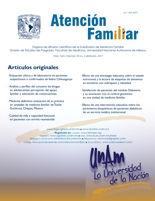Defensive Medicine: Evaluation of its Practice in Family Medicine Units in Tuxtla Gutierrez, Chiapas, Mexico
Main Article Content
Abstract
Objective: to evaluate the dimension of the defensive medicine practice in Family Medicine Units of the Mexican Institute of Social Security in Tuxtla Gutiérrez, Chiapas, Mexico. Methods: Cross-sectional and analytical study. Practice of defensive medicine was evaluated of 87 outpatient Family Medicine physicians from three Primary Care level units. The instrument was formed by 17 questions that explored perceptions, attitudes, and behaviors related to daily practice and five questions on socio-demographic and labor characteristics. The statistical analysis included the χ2 test, a p<0.05 as meaningful was established. Results: 92% of the surveyed persons showed some degree of defensive medicine practice. Staff labor shift was related to the practice of defensive medicine in some level (p=0.007). Conclusions: it was determined in this study that defensive medicine is highly practiced, so the doctor-patient relationship needs to be improved since an honest and open communication with the patient and his family could reduce the fear of legal repercussions and would allow the physician to act with greater freedom and judgment.
Downloads
Download data is not yet available.
Article Details
How to Cite
Ramírez Alcántara, Y. L., Parra Melgar, L. A., & Balcázar Rincón, L. E. (2017). Defensive Medicine: Evaluation of its Practice in Family Medicine Units in Tuxtla Gutierrez, Chiapas, Mexico. Atención Familiar, 24(2). https://doi.org/10.22201/facmed.14058871p.2017.2.59152
